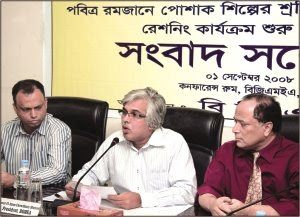THE holy month of Ramadan is the only month which has been explicitly described and analysed in the Holy Quran. The very fact that the revelation of the Holy Quran commenced in the month of Ramadan testifies to the sanctity, graciousness, and divine excellence of this sacred month.
The Holy Quran testifies: "Ramadan is the month in which was sent down the Quran as a guide to mankind, also clear signs for guidance and judgment between right and wrong." It was in this glorious month that Hazrat Ibrahim (pbuh) was blessed with the divine Sahifa, and the Holy Taurat reached mankind through Hazrat Musa (pbuh). It was in this month of sublime excellence that the sacred Zabur saw the light of day through Hazrat Daud (pbuh). Hazrat Isa (pbuh) received the Holy Injil on the 12th of Ramadan.
Allah ordains in the Holy Quran: "Whosoever of you is present during this month (the month of Ramadan) should spend it in fasting, but if anyone is ill, or on a journey, the prescribed period should be made up later."
Ramadan commences with the sighting of the new moon and ends when the new moon of Shawal is seen. Fasting is an ancient from of worship recognised by all previous religions. But Islam introduced a new spirit into the institution of fasting. For the first time in history, fasting was blessed with a systematic regulation, a scientific method, a noble justification. In the days before the Holy Prophet of Islam (pbuh), fasting meant the suffering of privation in the hours of mourning and sorrow. Islam introduced a revolutionary innovation, and al-Siyam stood not for mere suffering or abstinence but as an institution for the moral uplift and spiritual elevation of the human soul.
The restraint from the animal desire for food, drink and sex enables the attention of a human being to be directed to higher and nobler aspects. Fasting in the light of Islam helps us to overcome lust and thereby sets us on the path leading to perfection, which is to be achieved through prayers and penance, taqwa and tarawi, contemplation, acts of charity, and total abstinence from all evil acts and thoughts. The self-restraint of taqwa, indeed, has to be a voluntary effort comprising the elements of caution, alertness, and fear of Allah. Benign Providence Himself loves this glorious and voluntary attempt at self-restraint.
In his infinite compassion the Creator has stated: "Permitted to you, on the night of the fasts, is the approach to your wives … God knoweth what ye used to do secretly among yourselves. But He turned to you and forgave you. So now associate with them and seek what God had ordained for you, and eat and drink until the white thread of dawn appear to you distinct from its black thread; then complete your fast till the night appears."
Al-Siyam or the fasting during the holy month of Ramadan, one of the five pillars of Islam, is indeed a boon, a divine privilege a glorious opportunity unparalleled by any other act of piety or worship. Abu Huraira (RA) reported Allah's Messenger (pbuh) as saying: "When Ramadan begins, the gates of Heaven are opened, the gates of Jahannam are locked, and the devils are chained." (Bukhari and Muslim). Sahl B Sa'd (RA) reported Rasul Allah (pbuh) as saying: "In paradise there are eight gates among which is a gate called are-Rayyan which only those who fast will enter." (Bukhari and Muslim).
Abu Huraira (RA) reported Nabi Kareem (pbuh) as saying: "He who fasts during Ramadan with faith and seeking his reward Allah will have his past sins forgiven; he who prays during the night in Ramadan with faith and seeking his reward will have his past sins forgiven, and he who passes Lailat al-Qadr in prayer with faith and seeking this reward from Allah will have his past sins forgiven." (Bukhari and Muslim).
Anas B. Malik (RA) told of God's Messenger (pbuh) saying when Ramadan began: "This month as come to you, and it contains a night which is better than a thousand months. And it contains a night which is better than a thousand months. He who is deprived of it is deprived of all good, but only those who are denied prosperity are deprived of it." (Ibn Maja)
The Holy Prophet of Islam (pbuh) also said: "The one who fasts has two occasions of joy. One when he breaks his fast and one when he meets his Lord." (Bukhari and Muslim).
Salman al-Farsi (RA) told of Allah's Messenger (pbuh): "If someone draws near to God during it with some good act he will be like one who fulfils an obligatory duty in another month, and he who fulfils an obligatory duty in it will be like one who fulfils seventy obligatory duties in another month. It is the month of endurance, and the reward of endurance is paradise." (Baihaqi)
The holy month of Ramadan has come once again to teach us that the temporary renunciation of food and drinks, sex and greed, makes the fulfillment of the basic desires even more pleasant. Must we not forget even for a moment that there is a gulf of difference between roza and ordinary fasting.
Al-Siyam in Ramadhan can never be equated with mere abstention from food and drinks and sex. Siyam is something much nobler, much sublimer, more solemn than mere fasting. "It is an armour," declares the Holy Prophet (pbuh), "with which one protects oneself."
Let us, therefore, celebrate the month of Ramadhan in a befitting way, not through lavish iftar parties and expensive dresses (for the ensuring Eid), not through extravagance and prodigality, but through taqwa and tarabi, zakat and fitra, self-restraint and benevolence, prayers and penance. No sensible Muslim can afford to miss this blissful opportunity to learn self-restraint, to temper himself in the kiln of taqwa, and receive thereby divine mercy from the Creator.







